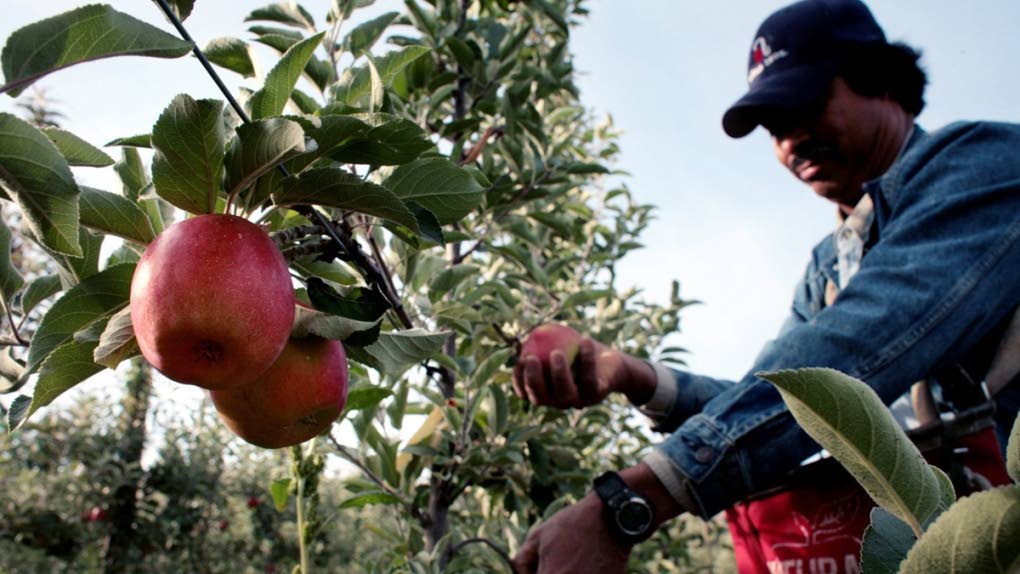Caribbean migrant workers risk covid19.... for Canada's food security

THOUSANDS of migrant farmers from the Caribbean leave their homes every year to travel to Canada to be part of the Seasonal Agricultural Workers Programme (SAWP).
This year, however, they face a new occupational health and safety challenge – covid19.
While all Caribbean countries have covid19, the outbreak is not as prevalent in the region as it is in Canada.
Worldometer statistics as at May 5 showed Canada has 61,165 total cases of which 30,942 are active and 26,305 recovered. There were 3,918 deaths out of a population of 37.59 million.
UWI, Mona, and Brock University in Toronto held a joint online panel on April 30 on the working conditions of these migrants.
More than 150 TT farmworkers are petitioning the government to allow them to travel to Ontario to take up jobs in the programme there. In TT the programme is organised through the Ministry of Labour and Small Enterprise Development.
On covid19, Dr Simon Black, assistant professor of labour studies from Brock, said migrant workers are usually healthy when they enter Canada and then become at risk for contracting covid19. Yet Canadian media depict the migrants as vectors of the disease.

Recently, before Jamaican migrants left for Canada, they were asked to sign a waiver releasing the Jamaican Government from any costs, damages and loss caused by exposure to covid19.
Migrant workers were originally included in Canada’s travel restrictions in mid-March, but agriculture stakeholders begged for them to be exempted.
“What we’ve seen from the covid19 experience is migrant farmworkers have emerged from a relatively invisible group, often characterised as low-skilled group of workers, to workers who are seen as skilled and essential to the Canadian economy.”
Unemployed Canadian citizens were considered to replace them, but he said it would take 2.5 workers from Quebec to replace a migrant worker in terms of skill and output.
“This work is anything but low skill. It is skilled, it requires training, and it requires years of practice and experience to become very good at it.”
However, the migrants fear accessing health services because they may lose their employment or immigration status.
There have been covid19 outbreaks in farms across the country. One began with a Canadian citizen working on a farm who then spread covid19 to the migrants.
Migrants in the SAWP programme who may have covid19 must self-isolate with paid leave for 14 days. The Canadian federal government announced a CAD$50 million programme to help cover the isolation requirements. Employers would get $1,500 per worker to subsidise wages, modify accommodation and cover other costs to deal with the pandemic protocols.
“The assumption is that migrant farmworkers in this context are vectors of the disease and not susceptible themselves to infection from the disease from Canadians working on the farm.”
Dr Liette Vasseur, Unesco chairman on community sustainability, works with organic vineyards in Niagara.

She said the covid19 planning for SAWP is highly-regulated. The workplace is inspected. There are policies and procedures in place to ensure workers who have symptoms of covid19 do not show up for work but are paid.
Covid19 made work on the farms highly-regulated. The vineyards she works with take “every precaution reasonable” for the protection of the labourer. This includes social distancing, sanitising equipment, plans for mental health and safety and encouraging workers from separate households to travel in different cars.
“They are really trying to support the employees. Each farm is supposed to have a plan.”
Farmers must prove they have a space to accommodate social distancing and self-isolation. A worker who has been exposed to covid19 must be reported to the Work Insurance Bureau, the Ministry of Labour, Training and Skill Development and a health and safety committee.
She recommends a website for migrants to connect and have information to explain what’s happening to them regarding SAWP and covid19, as information is hard to find on the web.
Prof Richard Bernal, pro-vice-chancellor of global affairs at UWI, described migrant labour as valuable to the Canadian agriculture sector and mutually beneficial for both Canada and the participating countries. The migrants provide “labour at critical time of harvesting,” and get a “valuable source of foreign exchange,” which may be their only income for the year.
UWI, St Augustine sociology lecturer Dr Talia Esnard described the migrant workers as an invisible class of people who are essential to the food security of Canada but drew parallels between SAWP and the plantation system.

The migrants feel vulnerable and expendable, as they fear deportation and have uncertain job security, because they may not be chosen the next year by the farmers.
“There is a lack of transparency of pathways to residency, opportunities to save, be mobile while they are there on the farms,” she said.
She said the farm owners use fear of job loss to silence the migrants and encourage “hyper-performance,” risking their health to overwork themselves to ensure they keep their job.
The migrants are considered “permanently temporary,” meaning there is no guarantee they will be chosen the next year to return to the programme. This creates a culture of silence around their working conditions and their health.
Esnard interviewed a woman who had fibroid surgery, did not tell her employer and worked during the six weeks she was supposed to be on bed rest, for fear she would be replaced.
Looking at the socio-historic culture of the migrants, particularly Caribbean migrants, Black described the SAWP model as problematic as it emerged out of the “legacy of indentureship.”
He said Canada solves a labour problem – employers have access to “cheap” labour – and the programme claims to give migrants “social end economic benefits” which include the ability to send money back home to their families.
However, Canadian media reports, he said, reduce the conversation about poor working conditions of migrants to whether they are good or bad employees. He said the vulnerability the workers experienced through SAWP is structural.
The Canadian government is responsible for immigration. The individual provincial government is responsible for employment standards such as occupational health and safety.
There is also a bilateral agreement between Canada and each participating country, established in individual memoranda of understanding, to arrange accommodation, travel, wage levels and repatriation.
He said the migrants are excluded from accessing labour protection and social rights, including overtime pay, hours-of-work provisions, and migrant farmers from SAWP cannot claim employment insurance, even though payments are deducted from their pay. They also do not have vacation or holiday pay.
Black said there is no pathway for citizenship or permanent residency and the migrants are socially isolated. SAWP operates on a closed work permit which ties an employee to an employer. Black said this makes migrants particularly vulnerable to deportation and blacklisting based on the employer’s recommendation.
Dr Claudette Crawford-Brown, lecturer in clinical social work, at UWI, Mona, said there must be a rigorous education programme to inform the migrants of their rights and what they can expect before they leave their country.She said most Jamaicans who take up these migrant farm labour are highly-skilled in farming but are illiterate, and having information on the migrant programme only in a written format on websites or brochures is unfair to the labourers. The responsibility should be on the Jamaican government to ensure their people are well informed before they leave the country, she said.
“Farmers are vulnerable in our society, in poverty. Poverty often leads to desperation and systemic inequities lead to a lack of choice. Desperation leads to giving up rights,” she said.
Sidebar
SAWP started in 1966 through a memorandum of understanding between the Jamaican and Canadian governments. Other Commonwealth countries joined shortly after, and Mexico joined in 1974.
Eleven Caribbean countries participate: Anguilla, Antigua and Barbuda, Barbados, Dominica, Grenada. Jamaica, Montserrat, St Kitts and Nevis, St Lucia, St Vincent and the Grenadines and TT.
Between January 1 and December 15, migrant workers go to Canada to work on the farms. They are allowed to work in Canada for no more than eight months, and must work a minimum of 240 hours within six weeks or less.
The migrants must have experience of working on farms. They can work in sectors such as apiary products, fruits and vegetables, including canning or processing the products, mushrooms, flowers, nursery-grown trees, including Christmas trees, tobacco, bovine, dairy, duck, horse, mink and more.


Comments
"Caribbean migrant workers risk covid19…. for Canada’s food security"